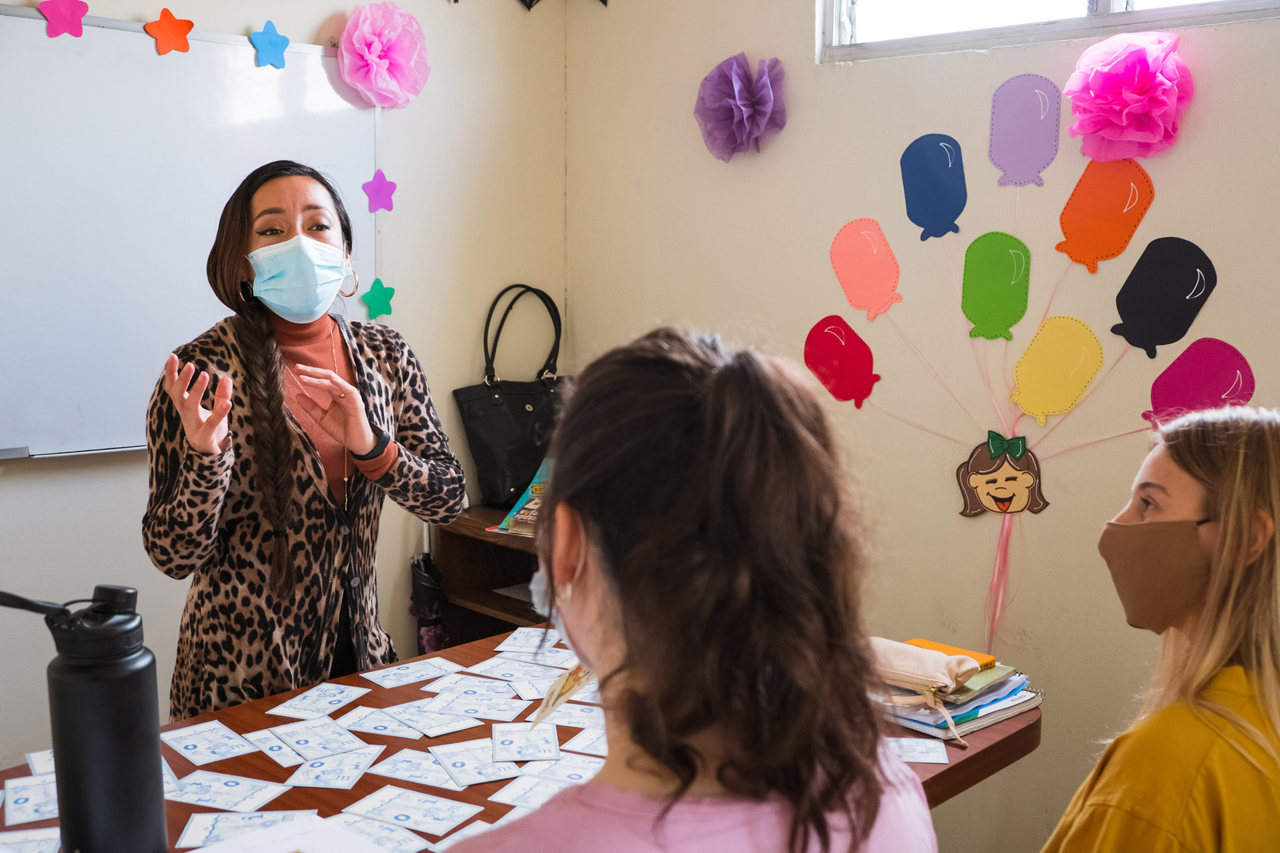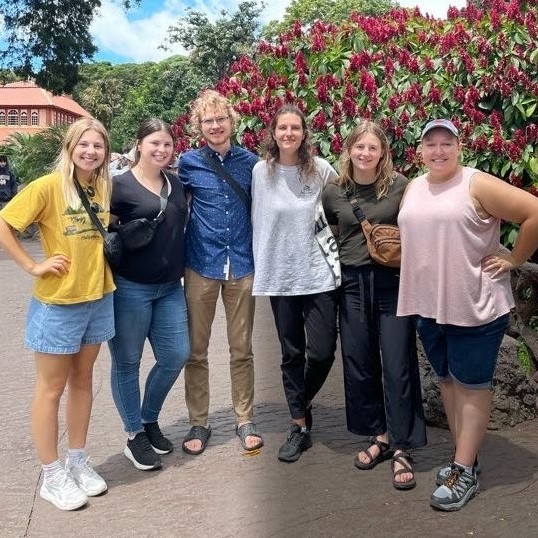
Guatemala – Fall Semester 2024
Guatemala Overview
Through a semester of living, learning, and working in Guatemala, students will gain new insights into the world and their own abilities, connecting the what they have learned through on-campus study with the realities that they encounter in Guatemala. In the process, students will complete 12 credit hours that can be applied across the broad range of CMU's undergraduate degree programs.
Estamos Guatemala is a cohort-based model, where students will travel together in community, experiencing Guatemala's hospitality, diverse ecology, and complex historical, religious, and cultural context. Topics of peace and justice, reconciliation and community, colonialism and indigenous Mayan rights, and much more will be explored through this immersive opportunity.
Through September and October, the focus will be on learning Spanish and deeply experiencing Guatemalan life while living in San Juan del Obispo. Two weeks in Guatemala City provide students with the opportunity to dig into the historical, social, and cultural context of Guatemala. Finally, during this time the group will travel to the ancient Mayan ruins of Tikal and to the cloud forest of Alta Verapaz to further encounter the diverse ecological and cultural splendor of Guatemala.
During the final month of the semester, students will be placed with organizations throughout Guatemala based on their areas of interest for a work-integrated learning/practicum placement. Opportunities for such community engagement may include working with an agroecology non-profit organization in the cloud forest of Alta Verapaz and supporting the community health education of a medical clinic in San Juan la Laguna.
Beyond the rich experiential learning, students will have ample opportunities to discover Guatemala and soak in its delightful culture. Highlights of these moments will include climbing a volcano, exploring remote jungle caves in Alta Verapaz, and falling in love with the colourful walls and cobblestone streets of Antigua.
An intercultural semester is the experience of a lifetime, complementing CMU’s range of richly integrative degrees.
Academic Overview

Credits
Spanish Language (6.0 credit hours)
Two of the following courses, based on previous knowledge:
- Beginning Spanish
- LANG-1211 – Beginning Spanish I: (3.0 credit hours) A study of the fundamental structures of Spanish with oral and written practice. This course is available only through CMU's Intercultural Programs, Guatemala sites only. For students with no prior knowledge of Spanish, or who have studied Spanish up to and including Grade 11 or its equivalent. Students with Grade 12 Spanish or its equivalent may not normally take this course for credit. May not be held for credit together with LANG-1210.
- LANG-1221 – Beginning Spanish II: (3.0 credit hours) A continuation of the study of the fundamental structures of Spanish with oral and written practice. This course is available only through CMU's Intercultural Programs, Guatemala sites only. Prerequisite: LANG-1211. May not be held for credit together with LANG-1220.
- Intermediate Spanish
- LANG-2211 – Intermediate Spanish I: (3.0 credit hours) Language study and practice in the classroom and language laboratory, and readings in Spanish culture. This course is available only through CMU's Intercultural Programs, Guatemala sites only. Prerequisite: Senior matriculation Spanish, LANG-1220, or LANG-1221. May not be held for credit together with LANG-2210.
- LANG-2221 – Intermediate Spanish II: (3.0 credit hours) A continuation of language study and practice in the classroom and language laboratory, and readings in Spanish culture. This course is available only through CMU's Intercultural Programs, Guatemala sites only. Prerequisite: LANG-2211. May not be held for credit together with LANG-2220.
- Advanced Spanish options are available to meet students at any level of Spanish fluency, including Advanced Conversational Spanish, Latin American Literature, Drama, and Guatemalan Literature. Advanced Spanish courses will be arranged on a case-by-case basis.
PCTS/IDS-2040/POLS-2041 – Global Issues: (3.0 credit hours)
Many countries around the globe face a similar set of issues as they relate to indigenous peoples, economics development, religious change, justice and peace, migration, and the environment. These issues take a specific form in Guatemala, a country that has been shaped by a 36-year-long war. This course will examine the following issues through the lens of the Guatemalan context: environment, Mayan culture and spirituality, war and peace, and migration.
This course may be used to fulfill the following program major requirements:
- Area course requirement in the Peace and Conflict Transformation Studies major
- Optional course requirement in the International Development Studies major
- World politics area requirement in the Political Studies major
- Social science foundation requirement in the Environmental Studies major
PRAC-3100 – Intensive Practicum: (3.0 credit hours)
Extending CMU's Practicum classes abroad, this course provides students with additional experienced-based educational opportunities. This component consists of four weeks working with local Guatemalan organizations in the student's area of interest/study. Placements will be facilitated by CASAS. Students will be expected to complete reflective assignments as part of their experience. Students have the possibility to stay in Guatemala for additional fees to complete an extra 3 credit hours of Practicum in special cases, after the cohort returns home. In such cases, students are responsible for covering their fees and living arrangements at CASAS.
Prerequisites
Estamos is designed for students who are further along in their degree programs at CMU. To be eligible, students must have a minimum of 24 credit hours of university-level studies, including 3 credit hours in introductory social sciences or permission of the Director of Estamos.
Itinerary

Dates and itinerary subject to change.
- September 2 – Arrival at CMU (optional)
- September 3–5 – Pre-trip orientation at CMU
- September 6 – Travel to Guatemala
- September 6–13 – Global Issues class in Guatemala City
- September 14 – Pacaya volcano hike
- September 15 – Move to San Juan del Obispo (near Antigua) with host families
- September 16–October 5 – Spanish class and cultural activities
- October 6 – Return to Semilla, Guatemala City
- October 7–10 – Global Issues class
- October 11–15 – Travel to Tikal Mayan ruins and Community Cloud Forest Conservation (Alta Verapaz)
- October 16 – Return to San Juan del Obispo
- October 17–30 – Spanish class and cultural activities
- October 31–November 1 – Free travel days
- November 2 – Return to Guatemala City
- November 3–29 – Practicum placements across Guatemala
- November 30 – Return to Guatemala City
- December 1 – Debrief and prepare to leave
- December 2 – Travel to Winnipeg
- December 3 – Free days
- December 4–5 – Debrief and presentations at CMU
Tuition & Fees

Estamos offers students a rich intercultural education and travel experience at a reasonable cost. The costs below cover the entire student experience, from arrival at CMU to departure from CMU at the end of the semester, and everything in between. Canadians and Canadian Permanent Residents will receive $5,000 in financial support from Global Skills Opportunity. Canadians and Permanent Residents who identify as low income, having a disability, or Indigenous may qualify for up to $5,000 beyond that, for a total of up to $10,000 in financial support (see notes below).
CMU scholarships and bursaries may be used towards Estamos program costs, excluding the Athletic Merit which will not be awarded for any semester that a student is participating in Estamos. Students may use government student aid and RESPs towards Estamos program costs.
| Estamos Program Costs (2024/25) | ||
|---|---|---|
| Canadian Citizens & Landed Residents | International Students | |
| Tuition | $2,563.92 | $4,488 |
| Field Study Fees1 | $7,612 | $7,612 |
| Accommodations and Food2 | $2,596 | $2,596 |
| Student Fees + Term Fee | $880 | $880 |
| Administration Fees | $1,203 | $1,203 |
| Sub-total | $14,854.92 | $16,779 |
| Grant from Global Skills Opportunity3 | ($5,000) | – |
| Grand Total | $9,854.92 | $16,779 |
| Additional grants up to $5,000 for Canadian citizens and Canadian permanent residents may be available to those identifying as low-income, Indigenous, or having a disability.4 | ||
1 Field Study Fees include flights, insurance, carbon offsets, local travel, entry to any museums and attractions, and other programming costs. Flight costs will be finalized upon purchase of airfare. Students may need to pay for local public transportation.
2 This covers all food and accommodations in Guatemala. Students will need to pay for meals while in transit to and from Guatemala.
3 A grant from Global Skills Opportunity allows all Canadian citizens and Canadian permanent residents a discount of $5,000, with additional funding available to students in the target groups.
4 The Global Skills Opportunity grant provides additional support up to an additional $5,000 for underrepresented students, using the following definitions:
- Low-income students: students who report to be in receipt of Canada Student Grants, or similar non-repayable student financial assistance offered by provinces and territories, or, in the absence of receiving non-repayable student financial assistance, can provide information to demonstrate that they require financial support to study or work abroad.
- Indigenous students: students who report being an Indigenous person, that is, First Nations, Métis, or Inuk (Inuit).
- Students with disabilities: students who report to have a difficulty or impairment due to a long-term condition or health problem and/or experience a limitation in their daily activities.
Payment Due Dates
- April 30, 2024 – $500 non-refundable deposit due
- September 1, 2024 – Remaining student payment
If you have questions about the Estamos program, please contact Tim Cruickshank, Director of Estamos, at tcruickshank
Printed from: www.cmu.ca/programs/estamos/guatemala




